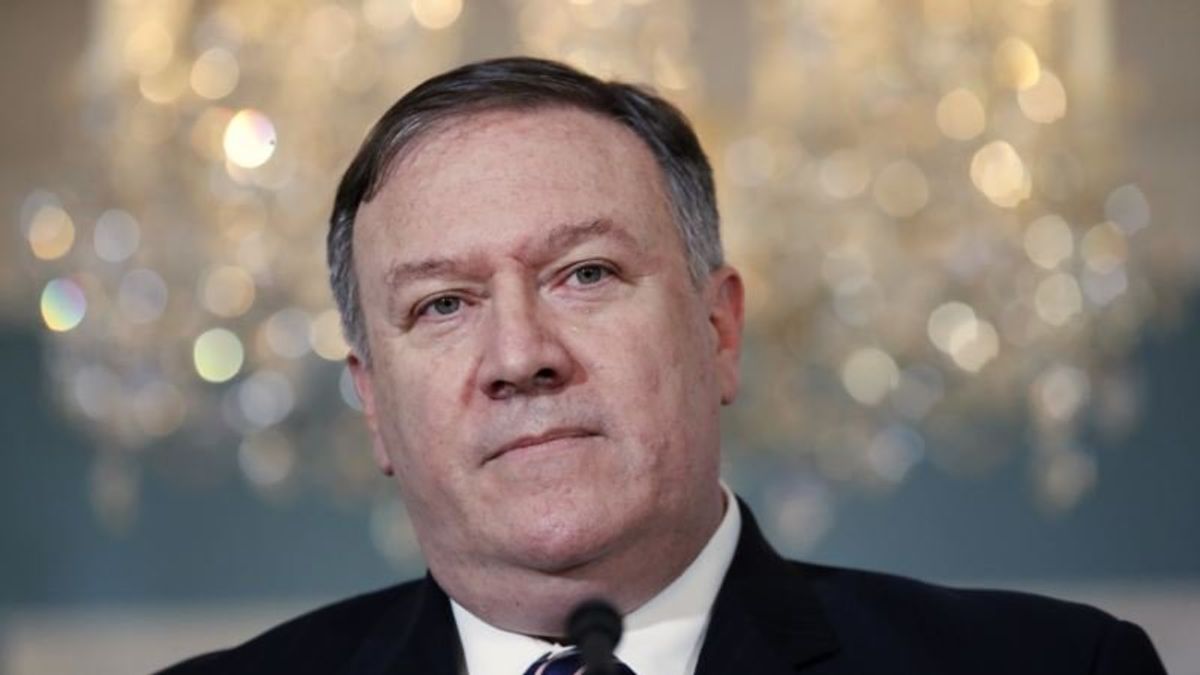
Pompeo Faces Challenges in Second Trump-Kim Summit
Pompeo Faces Challenges in Second Trump-Kim Summit

STATE DEPARTMENT —
Heading to Asia, U.S. Secretary of State Mike Pompeo said Friday that he hoped to develop options for the timing and location of the next summit between U.S. President Donald Trump and North Korea leader Kim Jong Un.
The top U.S. diplomat will meet with Kim during his North Korean visit, which will be his fourth.
"There are complex scheduling, logistics issues," Pompeo said en route to Japan, his first stop. He added he was hopeful that a general date and location for the summit might be reached in his meeting with Kim.
When asked whether he was taking any message or gift to Kim on Trump's behalf, Pompeo told the traveling press: "I am not bringing anything that we are prepared at this point to talk about publicly."
Earlier in the week, Pompeo said he hoped his North Korean visit would produce "better understandings, deeper progress, and a plan forward not only for the summit between the two leaders but for us to continue the efforts to build out a pathway for denuclearization."
But analysts said Pompeo faces challenges to ensure a second summit produces real progress toward denuclearization.
"I think they cannot come out of these trips anymore with broad statements of principles. There needs to be some actual, tangible movement on the nuclear issue," said Victor Cha, senior adviser and Korea chair at the Center for Strategic and International Studies (CSIS), a research group in Washington.
Core issues
North Korea has not addressed core issues, including providing a list of nuclear weapons and facilities, giving a way to verify that information, and presenting a timeline for disposing of these things, added Cha during a phone briefing on Friday.

North Korea has been seeking a formal end to the 1950-53 Korean War, but the United States has said Pyongyang must give up its nuclear weapons first. North Korea has not satisfied Washington's demands for a complete inventory of its nuclear weapons.
At a briefing on Wednesday, Pompeo would not give details of the ongoing negotiations, including the possibility of an end-of-war declaration.
While there is value to engagement at the highest levels, the downside is that this publicly raises the stakes for each meeting, according to former U.S. officials and experts.
"Real progress can only come from a sustained diplomatic process at lower levels, grounded in realistic expectations about what both sides can achieve," former State Department official Mintaro Oba told VOA.
"We don't have a diplomatic process in place," said Suzanne DiMaggio, senior fellow at the Carnegie Endowment for International Peace, a foreign policy research group with offices in Washington and other cities. "I would really like to see him go in there and lay out the vision for how do we get to a peace regime, step by step."
While Washington is resisting calls from Russia and China to relax tough international sanctions against North Korea, some former U.S. officials say the "maximum pressure" campaign is diminished by Trump's sometimes undiplomatic rhetoric.
"There's an 800-pound elephant in the room, and that is our own president," said Susan Thornton, who recently retired as principal deputy assistant secretary of state for East Asian and Pacific affairs.

"His actions have helped put the nail in the coffin of maximum pressure. For example, when he says North Korea is no longer a nuclear threat, that undercuts our diplomats," Thornton added Friday at the Carnegie Endowment for International Peace.
Pompeo will travel to Japan, North Korea, South Korea and China on Saturday through Monday. In Tokyo, he will meet with Japanese Prime Minister Abe and Foreign Minister Taro Kono. In Seoul, Pompeo will meet with South Korean President Moon Jae-in and Foreign Minister Kang Kyung-wha. In Beijing, he will meet with his counterparts and most likely will speak with Chinese President Xi Jinping.
Pompeo's trip to Beijing comes in the wake of a speech Thursday by Vice President Mike Pence in which he stepped up criticism of and laid out a more competitive strategy against China. Pence spoke at the Hudson Institute, a conservative research group in Washington.
'A renewed cold war'
Observers said Washington's new approach to Beijing was characterized by competition and confrontation.
"There is the beginning of some talk that we are really moving toward a renewed cold war, this time between the U.S. and China," said Bonnie Glaser, director of the China Power Project at CSIS.
While China wants stability in the Korean Peninsula and does not want a U.S. presence, Beijing is using the North Korea issue to strengthen its relations with Washington, added Glaser.
"My own guess is that the U.S.-China relationship will pretty much be on hold until after the midterm elections. The Chinese have some hope that some of what is going on is being motivated by political concerns and that there might be more of a chance for some reasonable, constructive dialogue with the United States after the midterms," said Glaser.
Senior officials traveling with Pompeo include Stephen Biegun, special representative for North Korea; Patrick Murphy, deputy assistant secretary of state for Southeast Asia; and Allison Hooker, the White House National Security Council's lead Korea official.
This will be Biegun's first trip to Pyongyang as U.S. envoy. It was widely expected that Biegun's North Korean counterpart, Vice Foreign Minister Choe Son-hui, would return to Pyongyang from Beijing for talks.
Pompeo received his invitation to return to Pyongyang during his meeting with North Korean Foreign Minister Ri Yong Ho on the sidelines of U.N. General Assembly session.
VOA's Jeff Seldin contributed to this report.
 Senate Votes to Move Kavanaugh Supreme Court Nomination ForwardNext PostCourt Rules for California Over US in Sanctuary City Case
Senate Votes to Move Kavanaugh Supreme Court Nomination ForwardNext PostCourt Rules for California Over US in Sanctuary City Case







